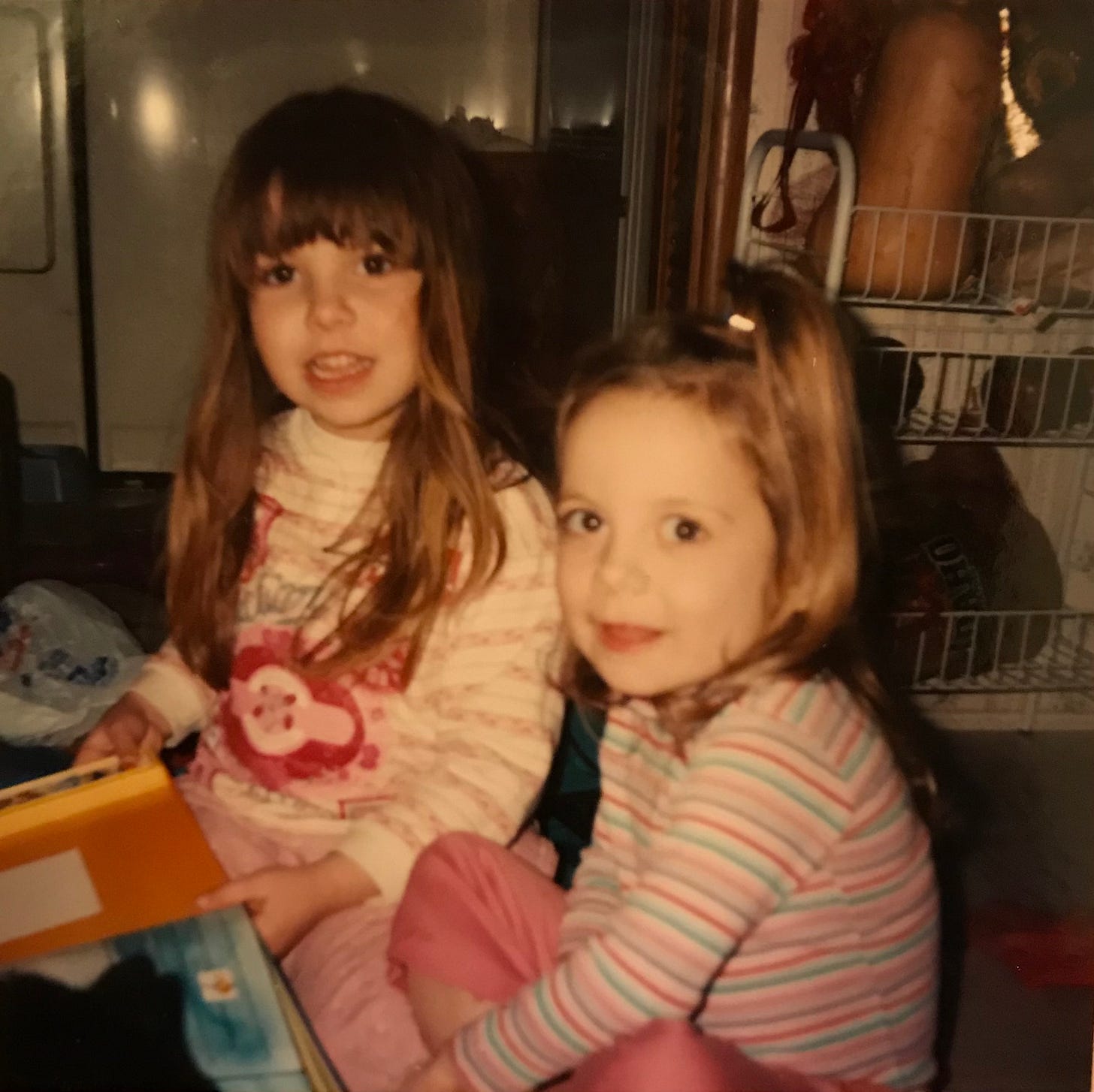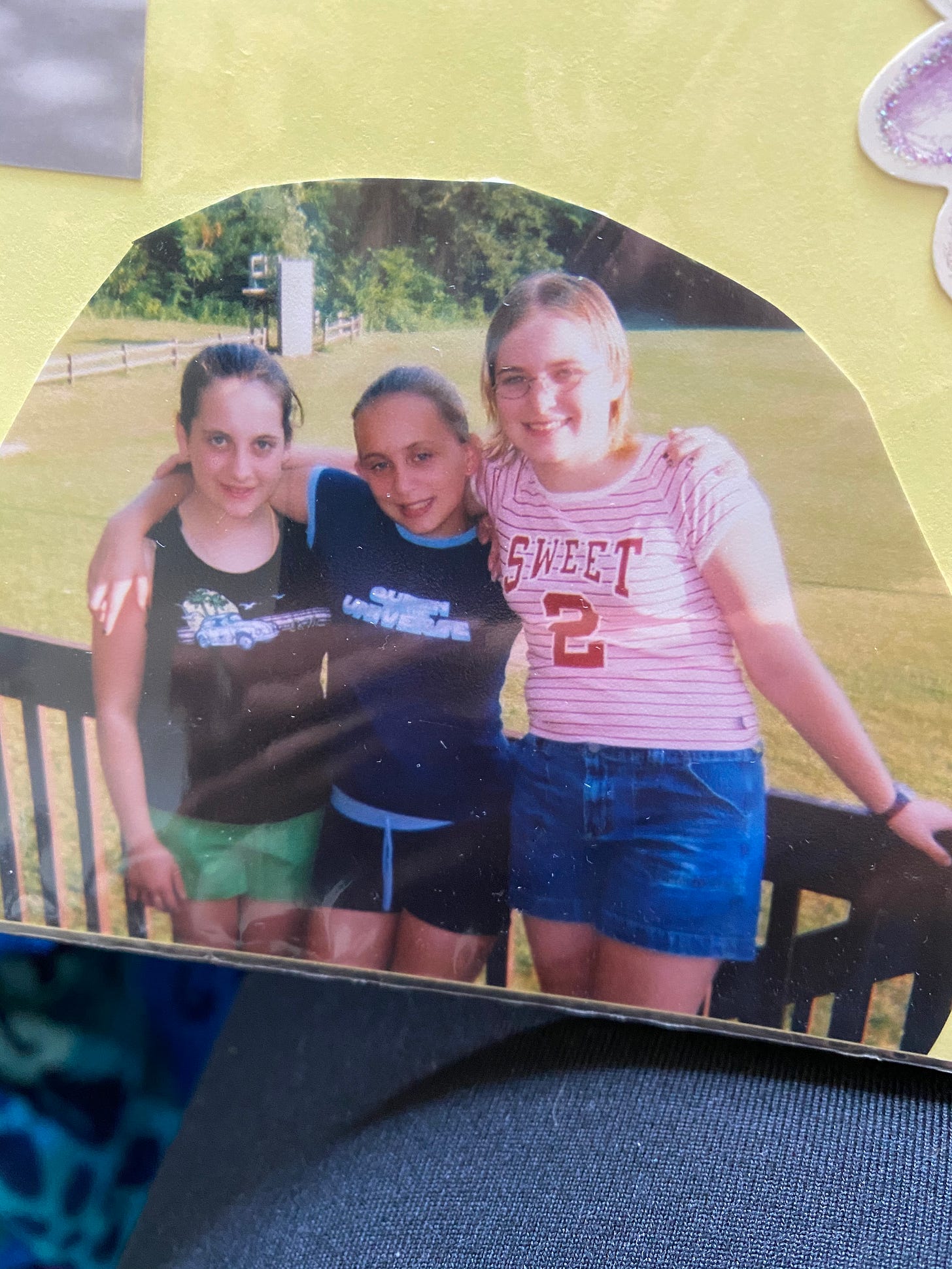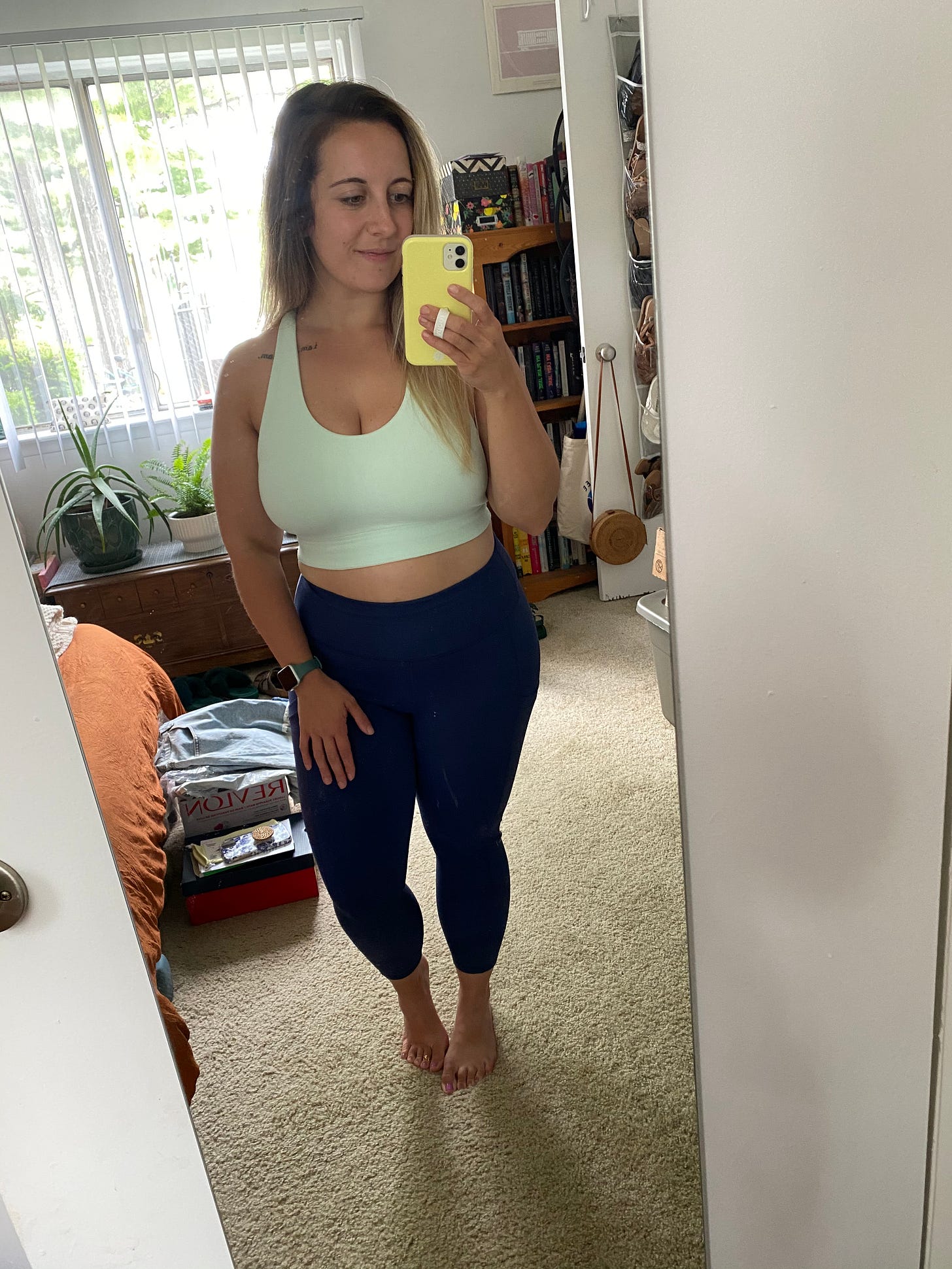Learning to Listen to My Body After a Lifetime of Trying to Silence It
On being both a victim of and an active participant in diet culture and the pressure to conform to society's expectations of thinness
I don’t remember the first time I was made aware of my body, only that I’ve always had a sharp sense of its inadequacy. I wasn’t tall enough, wasn’t pretty enough, wasn’t athletic enough. And when I failed my first hearing test, I had yet another deficiency to feel self-conscious about.
It became apparent that I had poor hearing pretty young. I was nearly impossible to understand when I spoke because I was pronouncing words the way that I heard them, and I could never hear my parents calling me. Since the first failed test, I had to get tubes in my ears five times by age 12. They did not work for me. So I sat in the front of the classroom, which made me feel exposed. I constantly had to ask people to repeat themselves, which was embarrassing. I just couldn’t hear like everybody else could, and it felt like my body was failing me before I ever gave it a reason to.
And then I gave it a reason to.
I was a small child in every sense of the word — short, thin, and shy. I wouldn’t have thought about the size of my body much if it weren’t for being constantly compared to my older sister, who was bigger than me. Even though I was being compared favorably (my family harbors a chronic and ubiquitous sense of internalized fatphobia), the comments always made me feel uncomfortable and defensive of my sister. Why did they care so much what our bodies looked like, and why was one better than the other? As I got older, the comments about my body became cruel, almost making fun of me for being thin in a family full of fat people, making remarks like “I don’t know where you got that body from” or “You sure didn’t get the fat gene!” which made me feel singled out and othered. I know now that these comments were a reflection of their own insecurities, but at the time, it just made me very critical of my body and any changes to it.
On more than one occasion, I overheard my dad/uncle/grandpa (all men, you’ll notice) say something to the effect of “if Liz isn’t careful, she’s going to get fat like the rest of us.” When I did eventually start putting on weight, it was like they’d been waiting for that moment my whole life. Their comments became self-righteous, like they took pleasure in my apparent downfall. I’d never hated myself more.
In third grade, I got my first training bra, for which my sister made fun of me relentlessly because I couldn’t have needed it less. In fact, I didn’t need a bra of any kind until age 13 when my body decided to make up for lost time and grow into a 36D in a matter of months leaving me with red stretch marks splayed across my chest like angry tiger scratches. By that time, I’d already had years of experience in self loathing, and yet the arrival of my breasts invited others to comment on my body more than ever. Suddenly, I had the eyes of grown men on me, which made me feel dirty and helpless. I felt like I had no control over my body or how people perceived me, so I started doing whatever I could to feel some semblance of control.
In high school, I tried to hide my bust by wearing two bras, a sports bra over a regular bra to create a sort of binder effect before I knew what a binder was. Over them, I wore my brother’s t-shirts, which were baggier than my own, and I prayed that no one would notice that I’d essentially given myself a uniboob. In gym class, I changed in the stalls with the other shy girls or, when that wasn’t an option, became an expert at changing without baring any skin whatsoever. I envied my friends who could get naked in front of me with no sense of shame while I always had to find a door, a blanket, or a towel to hide behind, something I’ve never grown out of.
My mother had her own issues with her body, which she was very vocal about. Though she did her best to talk kindly to her children and tell us we were beautiful and worthy, she was never kind to herself, and so I learned to speak about myself the way that she did. It didn’t help that I was constantly being compared to her in the looks department, and so every instance of “I’m so fat, disgusting, etc.” she vocalized felt like she was talking about me too. And I don’t blame her, because she’s also a victim! We were both raised in a society that hates women and wants women to hate themselves.
I don’t know a single woman who hasn’t been on some kind of diet at some point in her life. Most of my friends started dieting in middle school or earlier. I know people who were put on Slimfast as children and forced to join Weight Watchers as teenagers. Keto, Whole 30, Atkins, Paleo, carnivore, intermittent fasting, gluten free, and on and on forever. I’ve tried several of these, and even had a brief stint at Curves, the gym for women (remember that?). I’ve counted calories, taken up running, even dabbled in bulimia, all in the interest of making myself small.
The diet industry is a billion (that’s billion with a B) dollar industry that’s constantly inventing new things for women to be self conscious about. Love handles, hip dips, bingo wings, just to name a few. Every few months, there’s a new product we can buy to “fix” the problem they invented to get us to hate ourselves enough to give them more money. And the cycle continues. And when we were finally making progress in the body positivity/body neutrality movement, bam! Ozempic enters the scene. Suddenly, there’s a new miracle drug that will make us all skinny, and before we know it, Heroin Chic is back in.
I’m. So. Tired.
In 2020, stuck inside, I decided to yet again start a weight loss journey, and for the first time in my life, it worked. I ended up losing almost 40 pounds. I was praised for my hard work and dedication, and, of course, for my body. I felt so accomplished, so loved, and so energized to keep the good times going. But when the world started slowly opening back up, I realized that the reason I was able to maintain the weight-loss lifestyle (eating 1,200 calories a day, exercising 2-3 times a day, obsessively counting and measuring every single thing that went into my body) wasn’t maintainable in the real world. In 2020, I had nowhere to be and nothing but time to focus exclusively on shrinking my body. As soon as I was able to make plans with my friends, get dinner with my dad, or try new restaurants again, I put the weight back on. It was like I could either be thinner (not even thin, just thinner) or I could have a life, and I couldn’t do both.
Unfortunately, years of trying and failing to stick to this or that diet, stuck in the cycle of restricting and bingeing, I stopped being able hear my body’s hunger and satiation cues. It’s difficult for me to see the early signs of hunger, and sometimes I forget to eat until I’m ravenous and angry. Conversely, I also can’t tell when I’m full until I’m bursting at the seams. Years of ignoring what my body was trying to tell me, hating it, trying to force into a different shape, and it had finally had enough.
My early hearing problems felt like my body was failing me, but my eating disorder was me failing my body. I was so accustomed to not being able to hear that I stopped listening, and then my body stopped talking to me.
I once heard someone say that being thin was their “Roman Empire,” meaning that it was the thing they spent the most time thinking about. I think that’s true for a lot of women, myself included. There’s not a day that goes by where I’m not hyper-aware of my body and how it’s being perceived. When I imagine all the more productive things I could be using that mental energy toward, I get angry, but I can’t stop. It’s so deeply ingrained and it feels impossible that I will ever unlearn it.
I’d love to say that I’m all healed now and don’t struggle with food or my body, but that couldn’t be further from the truth. This is a lifelong endeavor, and to be honest, I still have more bad days than good days. Every time I have to go up a size or wear a bathing suit in front of people, I go back to that dark place of self loathing. I dread the summer time when I’ll have to expose my arms and legs, and I have to face away from the scale at the doctor’s office. I’m constantly comparing my body to other people’s bodies, and I don’t know how to not do that.
The thing is, I don’t want to care this much about what my body looks like. I know that my body is the least interesting thing about me, and I know that thinness does not equate to health. I know that I don’t care what anyone else’s body looks like, and therefore, nobody who isn’t a shitty person cares what mine looks like. And yet!!! I can’t argue that being in a thinner body is easier. When I lost weight, I was shown more love, more respect, more adoration. I enjoyed trying on clothes for once and putting together fun outfits. I was more confident than I’ve ever been. And part of me thinks that I can get there again if I just lose the weight. But I know that it’s not that simple.
To be clear: I am not looking for reassurance or compliments. I’m just hoping that writing about it will help me process it, and will hopefully help somebody else too.
I don’t have a solution to any of this by the way, so if that’s what you’re looking for, I’m sorry to disappoint you. I’m just so angry at the world we’ve created, I’m sad for the little girl I was who learned to think this way, and I’m frustrated with myself that I can’t seem to evolve beyond this way of thinking as an adult. But all I can do is take things one day at a time, one meal at a time, one reflection in the mirror at a time. I hope that some day, I won’t think about what I look like at all, good or bad. I hope to one day be able to listen to my body again and show it the love and compassion that it deserves. I hope we all can.





A few years ago I hired a nutritionist to deal with some hormonal issues. She told me that I should be eating more protein and fats, and less sugar, that women had been tricked by the diet industry with all the non-fat products. Fat and protein regulate blood sugar, and all this non-fat food we are encouraged to eat in diets messes with our hormones, it keeps us hungry and desperate, and so we eat more, and we need to start dieting again.
It’s a toxic cycle made for us to keep consuming. We’ve been terribly manipulated when it comes to food, eating habits and what’s healthy. And women’s bodies don’t have the same needs as men’s.
If I may, I recommend the book “Glucose Revolution” by Jessie Inchauspé, or just following her on Instagram (Glucosse goddess). She has an amazing approach to nutrition, and it’s not about loosing weight or how you look, it’s about actually being healthy. I’ve learned a lot from her research (she’s a biochemist).
another beautiful piece 💖